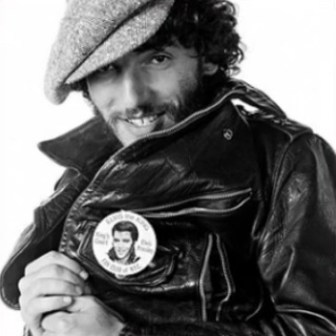Bruce on the artist
Whenever he could, Bruce would mention the enormous influence, Elvis had on him and on his music. Elvis is the most covered artist by Bruce (23 times) together with Chuck Berry, Pete Seeger, Bob Dylan. The Influence of Elvis on Bruce, is described in a
documentary compiled from previously existing footage by Dennis P. Laverty, a former Old Bridge resident who now lives in Staten Island (and who calls Springsteen and Elvis Presley "my two favorite rock stars". He used concert footage and previously released interview segments with Springsteen and various rock experts to show just how important Elvis Presley was to Springsteen.

"It's a cliché story, but watching Elvis Presley on The Ed Sullivan Show changed Bruce Springsteen's entire life. "It was the evening I realized a white man could make magic," he said in 2012, "that you did not have to be constrained by your upbringing, by the way you looked, or by the social context that oppressed you. You could call upon your own powers of imagination, and you could create a transformative self." He urged his mother to buy him a guitar after that, and in 1976 he went to Graceland after a Memphis show and even hopped the fence in a failed effort to meet the King himself. Elvis died during the recording of Darkness on the Edge of Town, right as Springsteen was hoping the King would cover his new song "Fire." Springsteen channeled his sorrow into "
Come On (Let's Go Tonight)," which later morphed into "Factory."
"In the beginning, every musician has their genesis moment. For you, it might have been the Sex Pistols, or Madonna, or Public Enemy. It's whatever initially inspires you to action. Mine was 1956, Elvis on the
Ed Sullivan Show. It was the evening I realized a white man could make magic, that you did not have to be constrained by your upbringing, by the way you looked, or by the social context that oppressed you. You could call upon your own powers of imagination, and you could create a transformative self. A certain type of transformative self, that perhaps at any other moment in American History, might have seemed difficult, if not impossible. And I always tell my kids that they were lucky to be born in the age of reproducible technology, otherwise they'd be traveling in the back of a wagon and I'd be wearing a jester's hat. It's all about timing. The advent of television and its dissemination of visual information changed the world in the fifties the way the internet has over the past twenty years. Remember, it wasn't just the way Elvis looked, it was the way he moved that made people crazy, pissed off, driven to screaming ecstasy, and profane revulsion. That was television. When they made an attempt to censor him from the waist down, it was because of what you could see happening in his pants. Elvis was the first modern Twentieth Century man, the precursor of the Sexual Revolution, of the Civil Rights Revolution, drawn from the same Memphis as Martin Luther King, creating fundamental, outsider art that would be embraced by a mainstream popular culture. Television and Elvis gave us full access to a new language, a new form of communication, a new way of being, a new way of looking, a new way of thinking; about sex, about race, about identity, about life; a new way of being an American, a human being; and a new way of hearing music. Once Elvis came across the airwaves, once he was heard and seen in action, you could not put the genie back in the bottle. After that moment, there was yesterday, and there was today, and there was a red hot, rockabilly forging of a new tomorrow, before your very eyes."
During the Rainforest Fund concert at 1995/04/12 Bruce played the song and used this as an intro :
" this is the second half of the show, gonna be a tribute to Elvis and his decade. It´s been done before and a lot prettier than we’re about to do it….but that´s ok, look at it like you’re 15 years old, you don’t know a whole lot about Elvis and your uncle gets up in the livingroom trying to explain to you what it was all about. So with that in mind I’ve written a song especially for this particular occasion. You remember the coach Tom Landry, when he was trying to explain his personal relationship that he had with God ? well, this is a song that’s sort of about my personal relationship with him….´´ [Taken from the Backstreets Magazine, issue 49.]